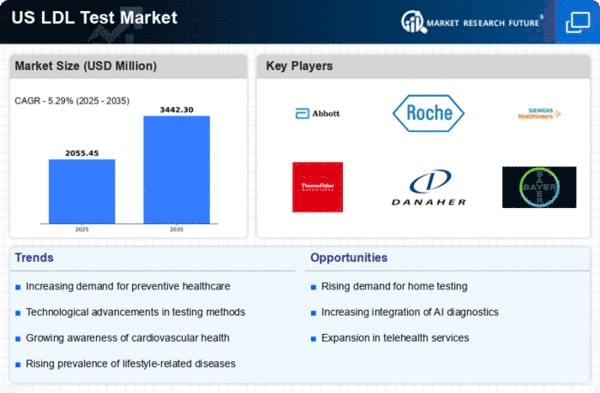Insurance Coverage Expansion
The ldl test market is positively impacted by the expansion of insurance coverage for preventive services. Many insurance providers are now offering comprehensive plans that include routine cholesterol screenings at no additional cost to patients. This development encourages more individuals to undergo ldl testing, as financial barriers are reduced. The increased accessibility to testing services is expected to drive market growth, with estimates suggesting a potential increase in testing rates by 10% over the next few years. As more people take advantage of these insurance benefits, the ldl test market is likely to experience a significant boost in demand.
Technological Advancements in Testing
The ldl test market is experiencing a surge in technological advancements that enhance the accuracy and efficiency of testing methods. Innovations such as point-of-care testing devices and automated laboratory systems are streamlining the testing process. These advancements not only reduce the time required for results but also improve the reliability of the tests. For instance, the integration of artificial intelligence in diagnostic tools is expected to increase the precision of ldl measurements. As a result, healthcare providers are more inclined to adopt these technologies, potentially leading to a market growth rate of approximately 8% annually. This trend indicates a promising future for the ldl test market as it adapts to the evolving technological landscape.
Growing Focus on Personalized Medicine
The ldl test market is witnessing a shift towards personalized medicine, which tailors healthcare strategies to individual patient profiles. This approach emphasizes the importance of understanding a patient's unique genetic makeup and lifestyle factors in managing cholesterol levels. As healthcare providers increasingly adopt personalized treatment plans, the demand for ldl testing is expected to rise. This trend may lead to a market growth rate of approximately 5% annually, as more patients seek tailored solutions for their health concerns. The integration of personalized medicine into the ldl test market reflects a broader movement towards individualized healthcare, enhancing patient outcomes and satisfaction.
Rising Demand for Preventive Healthcare
The ldl test market is benefiting from a broader shift towards preventive healthcare in the United States. As individuals become more proactive about their health, there is an increasing demand for routine screenings, including ldl tests. This trend is supported by various health campaigns and initiatives aimed at educating the public about the importance of early detection of health issues. The market is projected to grow as healthcare systems adapt to this demand, with an estimated increase of 7% in ldl testing services over the next five years. This proactive approach to health management is likely to solidify the role of ldl testing as a critical component of preventive healthcare strategies.
Increased Prevalence of Cardiovascular Diseases
The ldl test market is significantly influenced by the rising prevalence of cardiovascular diseases (CVDs) in the United States. According to the Centers for Disease Control and Prevention, CVDs account for nearly 697,000 deaths annually, highlighting the urgent need for effective screening and management strategies. As healthcare professionals emphasize the importance of monitoring cholesterol levels, the demand for ldl testing is likely to increase. This growing awareness among patients and providers about the risks associated with high LDL cholesterol levels is expected to drive market growth. The ldl test market could see a compound annual growth rate (CAGR) of around 6% as more individuals seek preventive measures against CVDs.
















